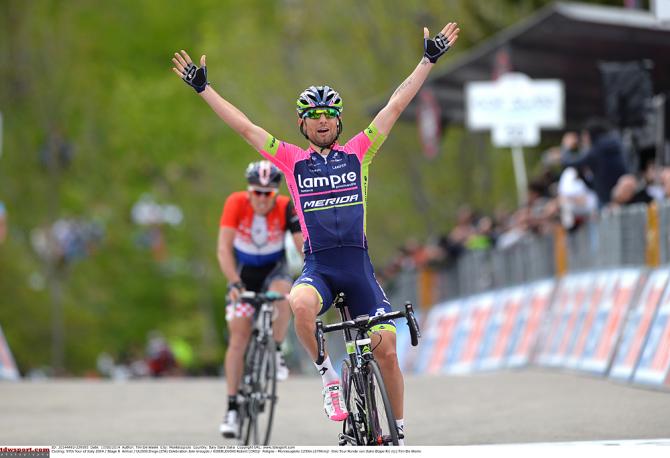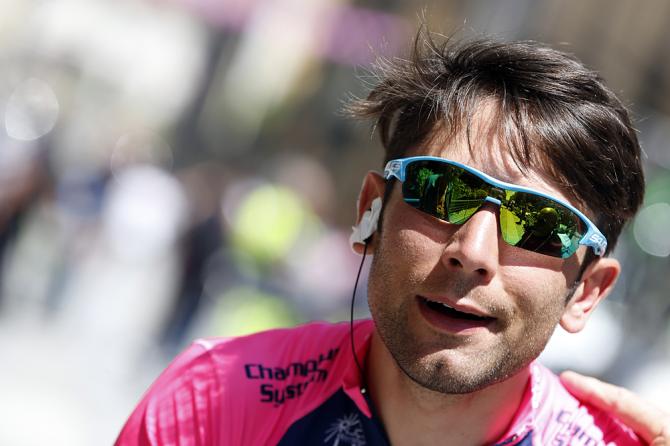Copeland feels MPCC rules need to be clearer
Lampre-Merida manager explains why team left in order to keep Ulissi on board





Lampre-Merida general manager Brent Copeland has explained that his team found itself between a rock and a hard place when it decided to leave the Movement for Credible Cycling rather than fire Diego Ulissi.
Ulissi was handed a nine-month ban after testing positive for salbutamol at last year’s Giro d’Italia and MPCC regulations state that member teams cannot hire riders who have received doping suspensions of six months or longer.
However, Copeland said that the wording of UCI contracts means that a team cannot rid itself of a rider if his suspension expires before his contract comes to an end. Ulissi has a deal with Lampre until the end of this season and can return to racing on March 28.
“It’s difficult for us to fire a rider. As far as labour laws are concerned it’s really difficult,” Copeland told Cyclingnews. “So you find yourself in a situation where if the rider is given two years or more [of a suspension], you can fire him. If he’s still got a contract by the time his suspension is up – which was the case with Diego, who got nine months – it’s difficult to fire him. So we were put in a situation where it was difficult to fire him.
“The MPCC said we had to either get rid of Ulissi or leave the organisation, so what do you do? You have a labour law civil case or you have the UCI against you.”
The wording of a key MPCC rule also seems open to interpretation. Article four of the MPCC charter states that teams “can't hire […] a rider tested positive and suspended more than six months,” something Lampre felt did not apply to Ulissi.
“Their rule isn’t clear and that’s the biggest problem. The rule says you cannot hire a rider,” Copeland said. “But we’re not hiring a rider: he already had a contract to the end of the year.”
Get The Leadout Newsletter
The latest race content, interviews, features, reviews and expert buying guides, direct to your inbox!
Copeland was careful, too, to reiterate that the Lampre team did not feel Ulissi was guilty of a deliberate doping offence. An anti-doping test at the Giro d’Italia last year revealed that Ulissi had 1900 ng/ml of Salbutamol in his system, significantly higher than the 1000 ng/ml allowed by UCI rules. He had declared the use of a Ventolin inhaler for bronchial spasms when undergoing the test, but struggled to explain such a high level of the drug. Ulissi has claimed that the Swiss Olympic Committee accepted that he acted negligently and not with the aim of improving his performance.
“Because it was up to negligence, we put out trust in the rider. We have faith in the rider, we trusted the rider and the decision was to keep him on and to do that we had to leave the MPCC because they didn’t seem happy about it,” Copeland said.
The MPCC signalled its displeasure in a statement issued last month, but Copeland said that he did not know if other member teams had been consulted on that stance or whether it had been decided upon by MPCC president Roger Legeay.
“That’s a question that they’ve got to answer. I know that when I went to the last MPCC meeting [in October – ed.] when they had the discussion about Astana, they had more or less a meeting together with everyone. Then they asked Astana to leave the room and had a vote internally, and then carried on the meeting. But with our case I don’t think they had much of that happening,” Copeland said.
“We tried to explain that we’re not hiring a rider, he’s got a contract already and we don’t want to find ourselves in a civil case lawsuit in Switzerland. It was either one or the other. We were put in a situation where we had to leave the MPCC in order to keep Ulissi on board.”
Lampre-Merida adhered to MPCC rules ahead of last year’s Vuelta a España when it pulled Chris Horner from the race after he returned low levels of cortisol during MPCC-mandated screening, and despite the current impasse over Ulissi, Copeland did not rule out re-joining the organisation in the future.
“If they made these rules clearer, there could be an eventual decision to go back,” he said. “And I’m sure it’s an experience for them as well, to learn from this. They’ve got to look at how the UCI and the civil case are more important than their rules and regulations. That’s not to misjudge them, but obviously civil laws are important.”